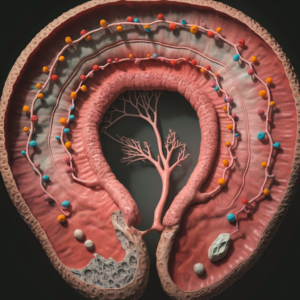Table of Contents
ToggleFunction of Placenta:
main functions of the placenta are exchange of metabolic and gaseous products between and fetal bloodstreams and production of hormones.
Exchange of gases:
exchange of gases, such as oxygen,carbon dioxide,carbon monoxide, is accomplished by simple diffusion.At the term the fetus extracts 20 to 30 ml of oxygen per minute from the maternal circulation and even short-term interruption of the oxygen supply is fatal to the fetus.placental blood flow is critical to oxygen supply, since the amount of oxygen reaching the fetus primarily depends on delivery, not diffusion.Exchange of Nutrients and Electrolytes:
Exchange of Nutrients and Electrolytes, such as amino acids, free fatty acids, carbohydrates, and vitamins, is rapid and increases as pregnancy advances.Transmission of Maternal Antibodies
Maternal antibodies are taken up by pinocytosis by the syncytiotrophophoblast and transported to fetal capillaries. in this manner the fetus acquries maternal antibodies of the immunoglobulin G (igG) (7S) class against various infectious diseases and obtains passive immunity against diphtheria, smallpox, measles, and others, but not against chickenpox and whooping cough.passive immunity is important because the fetus has little capacity to produce its own antibodies until after birth.Hormone Production
By the end of the fourth month the placenta produces progesterone in sufficient amounts to maintain pregnancy if the corpus luteum is removed or fails to function properly.In all probability all hormones are synthesized in the syncytial trophoblast .in addition to progesterone, the placenta produces increasing amounts of estrogenic hormones, predominantly estriol, until just before the end of pregnancy, when a maximum level is reached. these high levels of estrogens stimulate uterine growth and development of the mammary glands. During the first two months of pregnancy the syncytiotrophoblast also produces human chorionic gonadotropin (hCG), which maintains the corpus leutum. this hormone is excteted by the mother in the urine, and in the early stages of gestation , its presence is used as an indicator of pregnancy.Another hormone produced by the placenta is somatomammotropin (formerly placental lactogen).it is growth hormone-like substance that gives the fetus priority on maternal blood glucose and makes the mother somewhat diabetogenic. it also promotes breast deOther Site : Healthcdc.com
